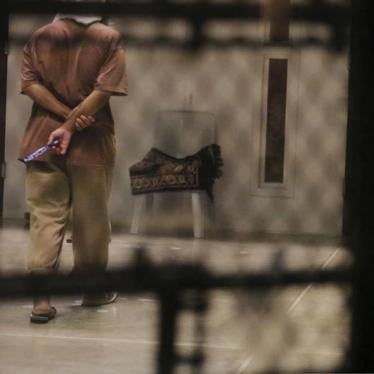August 6, 2018
American Psychological Association
Attn: Board of Directors and Council of Representatives
750 First St. NE
Washington, DC 20002
Dear Members of the Board of Directors and Council of Representatives:
We, the undersigned human rights and civil liberties organizations, are deeply concerned that the American Psychological Association (APA) is considering rolling back critical protections instituted to safeguard psychologists from complicity in torture and abuse and to facilitate ethical and independent mental health care for detainees at the Guantánamo Bay detention center.[1] We urge the APA not to take that step.
Guantánamo remains a human rights travesty and a grave threat to national security, where detainees tortured in U.S. custody are held indefinitely without charge or trial in violation of international law.[2] It is well documented, including by congressional oversight committees,[3] that some psychologists acting under the direction of the Central Intelligence Agency (CIA) and the Department of Defense (DOD) participated systematically in abusive detention and interrogation operations, including at Guantánamo. The legacy of psychologists’ involvement in torture, coupled with the extreme secrecy that continues to surround victims’ experiences, has adversely affected the provision of medical and mental health care, and undermined the ability of government psychologists to form therapeutic relationships based on trust.[4]
Current APA policy, as updated in 2015, recognizes this problem and admirably puts the onus on the government to enable access to independent psychologists, who are better positioned to provide detainees ethical and independent care.[5] The proposed reversal of this policy—allowing military and other government psychologists to resume treating detainees (New Business Item 35B)—turns a blind eye to history, undermines detainee welfare, and puts psychologists back at risk of being asked or ordered to participate in human rights abuses.
This is a precarious time. The United States has a president who has openly advocated for torture, and in January 2018 signed an executive order to keep Guantánamo open indefinitely. Even detainees long cleared for transfer appear to have no prospect of release. The country’s newly-confirmed CIA director played an operational role in the CIA’s torture program, including participating in the destruction of evidence. And one of the best tools for fully understanding how and why the U.S. adopted an official policy of torture, and for preventing its resurrection—the 6,700 page Senate torture report—has essentially vanished from the executive branch, at the direction of the chairman of the Senate Intelligence Committee.[6]
Actions taken by stakeholders like the APA—particularly ones with accredited status at the United Nations—matter deeply in this environment. Current APA policy sends a clear message that the association and the psychology profession are committed to strong human rights and ethical protections for national security detainees. We urge the APA to reaffirm that commitment by rejecting New Business Item 35B.
Sincerely,
American Civil Liberties Union
Human Rights Watch
Amnesty International USA
National Religious Campaign Against Torture
Center for Victims of Torture
North Carolina Stop Torture Now
Defending Rights and Dissent
Physicians for Human Rights
Human Rights First
[1] Peter Aldhous, Psychologists Are In A Nasty Fight About A Report On Torture, BuzzFeed News, July 26, 2018, available at https://www.buzzfeednews.com/article/peteraldhous/psychology-torture-guantanamo-interrogation.
[2] Juan E. Méndez, UN Special Rapporteur on torture and other cruel, inhuman or degrading treatment or punishment, Ben Emmerson, UN Special Rapporteur on human rights and counterterrorism, Mónica Pinto, UN Special Rapporteur on independence of the judiciary, Seong-Phil Hong,Chair-Rapporteur of the UN Working Group on Arbitrary Detention, and Michael Georg Link, Director of the OSCE Office for Democratic Institutions and Human Rights (ODIHR), Open Letter to the Government of the United States of America on the occasion of the 14th anniversary of the opening of the Guantánamo Bay detention facility, Jan. 11, 2016, available at https://www.ohchr.org/en/NewsEvents/Pages/DisplayNews.aspx?NewsID=16935&LangID=E.
[3] U.S. Senate, Senate Select Committee on Intelligence, Committee Study of the Central Intelligence Agency’s Detention and Interrogation Program, December 9, 2014, 10, 32, available at https://fas.org/irp/congress/2014_rpt/ssci-rdi.pdf; U.S. Senate Armed Services Committee, Report of its Inquiry into the Treatment of Detainees in U.S. Custody, November 20, 2008, xii, 69, 100, 102, available at https://www.armed-services.senate.gov/imo/media/doc/Detainee-Report-Final_April-22-2009.pdf
[4] Physicians for Human Rights, Letter to APA, August 5, 2018, available at http://physiciansforhumanrights.org/press/press-releases/letter-to-apa-urging.html; Center for Victims of Torture, Letter to APA, August 1, 2018, available at https://www.cvt.org/sites/default/files/attachments/u93/downloads/CVT%20APA%20letter%208-1.pdf.
[5] Policy Related to Psychologists' Work in National Security Settings and Reaffirmation of the APA Position Against Torture and Other Cruel, Inhuman, or Degrading Treatment or Punishment, available at http://www.apa.org/about/policy/national-security.aspx.
[6] Jeremy Herb, Trump administration returning Senate torture report, CNN, June 3, 2017, available at https://www.cnn.com/2017/06/02/politics/senate-report-torture-trump-administration/index.html.









